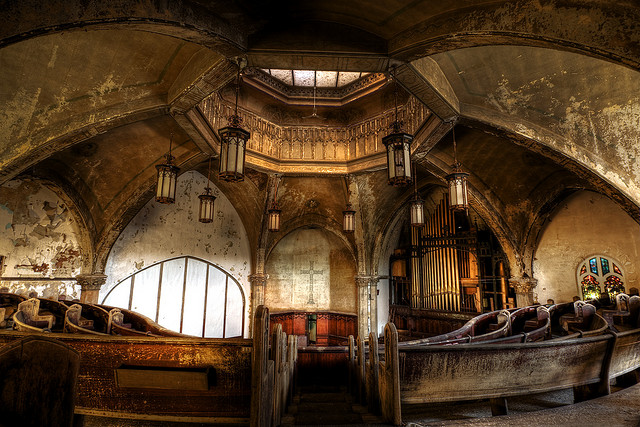The Smith Commission must not ignore the status of state religion in Scotland
The Smith Commission is the body tasked with recommending proposals for the final status of Scottish devolution following the referendum on Scottish independence. Norman Bonney argues that state religion should not be left out of the equation, and the special constitutional status of Presbytarianism and the continued role of Bishops in the House of Lords occasionally voting on Scottish matters should be looked at and reformed.

An abandoned Presbyterian church (Credit: Rick Harris, CC BY ND 2.0)
The rushed process of determining the main features of the new devolution settlement for Scotland following Scottish voters rejecting proposals for independence in the referendum on 18 September 2014 and the prior vows of the unionist parties for even greater powers for the Scottish Parliament and Scottish Government, risks overlooking key opportunities for constitutional rationalisation that have not yet been broached by interested parties.
Among matters that might also be considered and resolved in accompanying legislation or as part of the final package are those surrounding the status of state religion in Scotland and the UK.
The special constitutional status of Presbyterianism in Scotland
First among these is the obligation falling on a newly incumbent monarch, immediately at accession and according to the Acts of Union of 1707, to swear ‘to maintain and preserve the True Protestant Religion and the Presbyterian form of church government in Scotland’. This obligation arose out of the desire of the Scottish negotiators over three hundred years ago to ensure that neither Roman Catholicism nor Anglican episcopalianism was imposed as the state religion in Scotland.
It is time that the provision was repealed; the power to do so should be given to the Scottish Parliament to resolve the issue. Repeal could only but improve the climate of relations between the religious groups in Scotland and moderate the sectarian differences that from time to time are of concern to the Scottish authorities.
As a result of repeal the Church of Scotland would lose its special relationship with the UK monarch and its special constitutional position. It would become one church among many denominations and would no longer be the national church – but at present less than one third of Scots profess any adherence to the church.
The UK Parliament and state religion
Other legislation affecting the constitutional and religious status of the monarchy could remain the responsibility of the UK Parliament. This would include the Accession Declaration Act of 1910 which requires a new monarch to declare Protestantism and reject Roman Catholicism and the Coronation Oath Act of 1688 which similarly requires professions by the new monarch of Christianity and the defence of Protestant Reformed religion and the privileged status of the Church of England.
One of the many consequent anomalies of having 26 bishops of the Church of England as voting members of the non-elected house of the UK legislature is that they contribute to the making of laws not only for England but also for Northern Ireland, Scotland and Wales. In the case of the Equality Act of 2010 their votes were decisive in excusing religious organisations from provisions of the Act that fall upon other bodies – and this applied across the United Kingdom.
Others are examining the complexities of attempting to achieve English votes for English laws in the House of Commons. There appears to have been little consideration about how such measures might impact upon the other House but there is certainly a case to be made that clerics of the Church of England should not exercise their votes on matters that affect the parts of the United Kingdom beyond the borders of England. Such matters could be left to the devolved legislatures to resolve.
The timetable for resolving these and related constitutional issues, involving the most complex restructuring of the UK state since 1707, is very tight but it is important that matters such as those raised here also get due consideration before final decisions are made.
—
Note: this post represents the views of the author, and not those of Democratic Audit or the LSE. Please read our comments policy before posting.
—
 Norman Bonney was a lecturer and researcher at Aberdeen University and, The Robert Gordon University, Aberdeen. He was head of psychology and sociology at Edinburgh Napier University, where he is currently Emeritus Professor. His ‘Monarchy, religion and the state; civil religion in the UK, Canada, Australia and the Commonwealth’ was published by Manchester University Press in October 2013. Further details can be found here. His recent publications are listed here.
Norman Bonney was a lecturer and researcher at Aberdeen University and, The Robert Gordon University, Aberdeen. He was head of psychology and sociology at Edinburgh Napier University, where he is currently Emeritus Professor. His ‘Monarchy, religion and the state; civil religion in the UK, Canada, Australia and the Commonwealth’ was published by Manchester University Press in October 2013. Further details can be found here. His recent publications are listed here.
.





 Democratic Audit's core funding is provided by the Joseph Rowntree Charitable Trust. Additional funding is provided by the London School of Economics.
Democratic Audit's core funding is provided by the Joseph Rowntree Charitable Trust. Additional funding is provided by the London School of Economics.
The Smith Commission must not ignore the status of state religion [protestant church] in Scotland https://t.co/Y4MaVVlpuq
Essay of the week: Smith Commission must not ignore the status of state religion in Scotland https://t.co/KimuO3OlBt https://t.co/fC83MzQaJi
Smith Commission devolution package could give power to Scottish Parliament to renounce monarch’s preferment of… https://t.co/6Zv0EkV5c3
Devo plans should end role of @c_of_e bishops in UK law making for #Scotland, NI, #Wales https://t.co/6j7PWtPUBV #indyref #politics #faith
Scots devo plans should enable @scotparl to end @churchscotland privileged status in #Scotland https://t.co/6j7PWtPUBV #indyref #ukpolitics
Scots devo plans should enable @ScotParl to end monarch’s preferment of Protestantism & Presbyterianism in #Scotland https://t.co/dHI2MhH1ZF
“The Smith Commission must not ignore the status of state religion in Scotland” https://t.co/bjJd4gAwps
The Smith Commission must not ignore the status of state religion in Scotland https://t.co/x5IeGtTipz https://t.co/PYhVSysvEG
#FutureCofE bishops should not have power to make laws in #Scotland #Wales, NI, https://t.co/6j7PWtPUBV English votes for English bishops
English votes for English bishops? #FutureCofE https://t.co/dHI2MhH1ZF #faith #religion #democracy #secularism #Publicspirited #indyref
@c_of_e bishops should not make laws for #Scotland, NI or #Wales. English bishops for English laws. https://t.co/dHI2MhH1ZF #FutureCofE
The Smith Commission must not ignore the status of state religion in Scotland https://t.co/OcEM1IYyUX